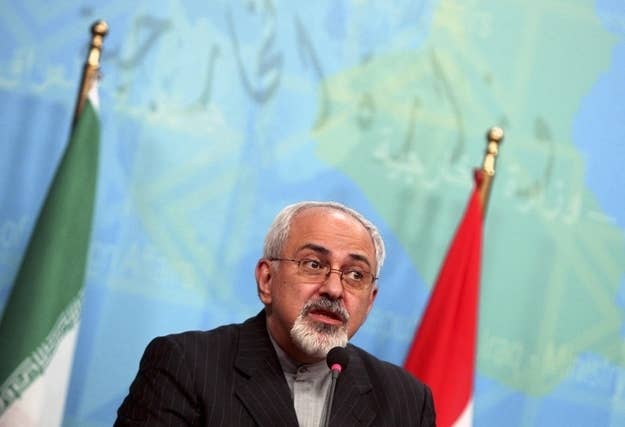
UNITED NATIONS — The United Nations General Assembly has Iran rapprochement fever this year.
The prospect of high-level engagement between U.S. and Iranian officials during the annual international meet seemed increasingly likely on Monday as plans were announced for a meeting of the select group devoted to Iran's nuclear issue, during which Secretary of State John Kerry will meet Iranian Foreign Minister Javad Zarif, as well as a lunch to which both President Obama and Iranian President Hassan Rouhani will be invited. In addition, Britain's top diplomat, after meeting with Zarif, told reporters that the United Kingdom was open to working with Iran and even reopening its embassy in Tehran. All Western parties still say, however, that real engagement with Iran can only come with a nuclear deal.
Catherine Ashton, the European Union's foreign policy chief, announced after a meeting with Zarif on Monday morning that Iran and the P5+1 (the five permanent Security Council members plus Germany) would take place in New York this week. The State Department confirmed to BuzzFeed that the meeting will take place on Thursday. Both Zarif and Kerry are expected to attend, constituting the highest-level meeting between U.S. and Iranian officials since 1979.
After the Ashton meeting, Zarif tweeted, "Positive initial meeting with Ashton.Meet with 5+1 ministers on Thursday and next round in October.Need new start under new circumstances."
The encounter between Zarif and Kerry might be supplemented by a quick handshake or exchange of words between President Obama and his Iranian counterpart. Al-Monitor reported that Rouhani has been invited to a lunch for visiting heads of state hosted by U.N. Secretary General that Obama will also attend.
A spokesperson for the Iranian Mission to the U.N. did not immediately return a request for comment about whether Rouhani will attend the lunch.
Asked if the lunch could result in a quick impromptu meeting between Obama and Rouhani, a spokesperson for the National Security Council referred BuzzFeed to deputy national security adviser Ben Rhodes' comments aboard Air Force One on Monday.
"We have no meeting scheduled with President Rouhani, though, as you've heard us say repeatedly, we don't rule out that type of engagement," Rhodes said.
"I'm not saying anything different than what we've said, which is the president is open to engagement," Rhodes said. "He's exchanged letters with Rouhani. We simply have not had a meeting scheduled. I was just indicating that this is not something that we object to in principle."
White House Press Secretary Jay Carney told reporters that the administration's willingness to meet with the Iranians is "commensurate with a willingness by Iran to be serious about dealing with its nuclear weapons program."
"It's really 50/50," Trita Parsi, president of the National Iranian American Council, said of the chance that Rouhani and Obama could meet. "Expectations have gotten pretty high, so if there isn't a handshake there's going to be a lot of disappointment."
"The risk that both sides are looking at is they know there is a cost for them if they shake hands," Parsi said. "What they don't know is what's the benefit. If everything had been prearranged, they would know what the benefit is."
Speaking to reporters after his meeting with Zarif, British Foreign Secretary William Hague said the meeting had been productive and had focused on the nuclear issue, Syria, and boosting the bilateral relationship between Iran and the United Kingdom.
"There is a chance for improved relations with Iran because if the statements of President Rouhani and Foreign Minister Zarif really mean something, if they really mean what they are saying, then certainly there is a chance to improve relations and work together across a whole range of subjects," Hague said, calling for the statements to be matched by "concrete steps."
"We are ready to reciprocate" if Iran cooperates, Hague said. "And I'm making that clear to my Iranian counterparts and so, I believe, are many other of my colleagues from Western countries. There isn't time today to go over the whole nuclear negotiations, but we all agree we need to continue to revive the E3+3 process with Iran, so we will be doing that in the coming days as well."
Asked if there was a possibility of reopening the British embassy in Tehran, which was shuttered after being attacked in 2011, Hague did not rule out the possibility but said he would need a guarantee that the embassy could operate normally.
"We don't want a confrontational relationship with Iran," Hague said.
